Early Reading
Teaching children to read and write independently, as quickly as possible, is one of the core purposes of a primary school. These key skills not only hold the keys to the rest of the curriculum but also have a huge impact on children’s self-esteem and future life chances.
Reading and writing are both two part processes: readers decode and comprehend, writers create and encode. In one respect, decoding and encoding are the ‘mechanical’ skills that children need to master in order to be able to comprehend what they read and write creatively. Research has shown that by teaching phonics thoroughly and rigorously to children, we can ensure that they use this knowledge to decode effortlessly and automatically. This means all energy can be focused on understanding and enjoying what is read and on composing and creating fantastic writing. Ofsted: Reading by six.
Our detailed sequenced reading programme provides additional information.
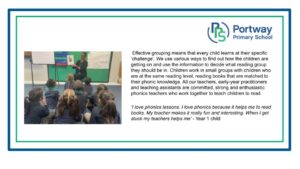
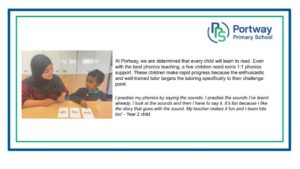
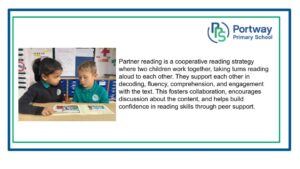
How do you teach a child to read?
The English spelling code is one of the most complex in the world. It has evolved over hundreds of years and has had many different influences. As a result, our words are made up of combinations of 44 different sounds but many of these sounds are spelt in different ways in different words. Furthermore, we only have 26 letters to write these sounds down. This can lead to real confusion for children as letters combine together in different words to make different sounds. For example, the letter ‘a’ sometimes makes the sound /a/ (c-a-t), or, with other letters, the sound /ay/ (d-ay) or the sound ‘air’ (f-air). This can be overwhelming.
In order to help the children conquer this complex code, we teach it to them systematically, using a system based on a programme called Read Write Inc.
We start by teaching children to read the first thirty sounds (Set 1 Sounds) and to be able to blend these sounds to read words (i.e. to know that the sounds c/a/t can blend together to read the word cat). Once they have conquered this skill, they start reading stories and texts that have words made up of the sounds they know. This means that they can embed and apply their phonic knowledge and start to build their reading fluency. At the same time, we teach them how to write the sounds and use this knowledge to spell words, leading to writing short sentences.
How do you build on this initial knowledge?
As their confidence and fluency grows, we start to introduce more sounds (Set 2 and then 3) and the children read texts with increasingly more complex sounds and graphemes (different ways of spelling the sounds, e.g. /igh/, /ie/ or /ay/, /ai/). They learn that a sound can be written using 2 or 3 or even 4 letters. We call this a grapheme (e.g. igh represent the /i/ sound in the word night). Equally they learn to use these graphemes to spell words.
In short, the essence of our reading programme is based on the belief that by reading the sounds, you can read the words, and so the story. But, if it is hard to understand what sounds the words are made up of, it is hard to read the words accurately and so it is hard to understand what has been read. Additionally, if it takes too long to work out what the words are, it is difficult to understand the story as the meaning gets ‘lost’ in the individual words. Fluency and accuracy are key to comprehension.
What about comprehension?
Being able to decode a text alone is not enough. Children need to comprehend what they are reading and need to be actively taught key comprehension skills from a very early age. We do this through comprehension activities linked to the stories the children come to read with Read Write Inc, and also through a range of different literacy activities based around core texts shared with the children in class. We know that good readers question, check and engage with their own understanding – these are some of the skills we seek to develop. We know that decoding and comprehension should not be taught in linear progression but need to be taught simultaneously.
Where does vocabulary fit in?
Our entire curriculum has a strong emphasis on vocabulary acquisition. Vocabulary is key to understanding and learning. Children need to know, through active teaching, what words mean in order to understand what they have read.
What does this all look like in practice?
At Portway, we are determined that every child will learn to read. We track reading progress as follows:
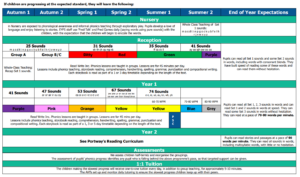
Reading at home
Reading development at school is supported by practice at home. All children have a book bag which allows them to take home books from our school library to enjoy at home.
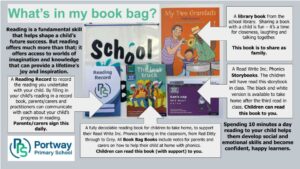
What happens next?
Once children have learnt to read independently, they move onto our English programme. All of our teaching and their learning is now directed at developing their comprehension skills and writing. Work is focused on a series of carefully chosen quality core texts which act as the stimulus to teach higher level comprehension, build knowledge and develop a love of reading and literacy.
